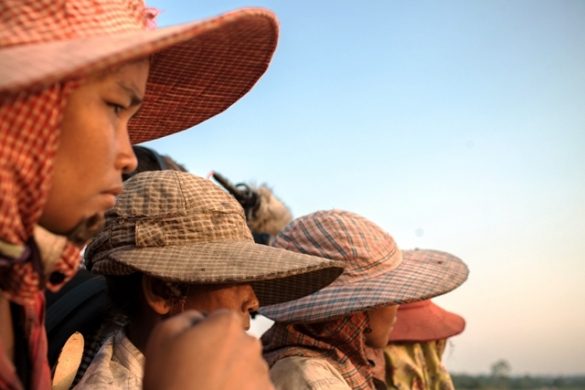Mange bønder i Cambodja har ikke skøder på deres jord og risikerer derfor, at den bliver solgt eller lejet ud under deres fødder. Stor efterspørgsel efter sukker gør det attraktivt at overtage landbrug og omlægge dem til sukkerrørsplantager.
PHNOM PENH, 2 October 2013 (IRIN) – Song Kong, a 56-year-old farmer in Cambodia’s southern Koh Kong Province, vividly recalls the day in 2006 when a bulldozer arrived and began clearing his paddy field to make room for a sugar plantation. Since then, life has become much worse for him and 456 other families who also lost their land in Sre Ambel District.
“Before my farmland was taken from me, I was able to save at least US$1,000 every year. Now, I don’t have any land, so I rely on fishing in the rice fields and streams,” said Kong, a representative of the community. He earns between US$1.25 and $2.50 per day – not enough for his family of six to live on – so there is nothing left to put aside for a safety cushion, or plan for a better future.
Kong is not alone. Across Cambodia more than 700,000 people have lost their homes and land due to economic land concessions, many to plantations that supply sugar to some of the world’s largest beverage brands. Sugar cane covers more than 100,000 hectares of Cambodia.
Rights groups say sugar is one of the biggest drivers of land evictions. With the global demand for sugar expected to increase by 25 percent by 2020, advocates warn that more rural Cambodians will be pushed off their land to make room for companies supplying PepsiCo and Coca-Cola, two of the world’s largest purchasers of sugar, according to a new Oxfam report released on 2 October.
“We found evidence that sugar production has a large influence on land rights, and there is more and more evidence of the effects sugar has on land grabs,” said Gertjan van Bruchern, Oxfam’s associate country director in Cambodia.
Mounting criticism both nationally and internationally led Prime Minister Hun Sen to hand out land titles to communities across Cambodia just ahead of this year’s national election. Cambodian government spokesman Phay Siphan said a moratorium by Hun Sen had put a halt to all land concessions since 2012.
However, Eang Vuthy, executive director of Equitable Cambodia, the Oxfam local partner that works with many communities where evictions have occurred, said new sugar cane fields were still being planted on undeveloped concessions.
Most Cambodians do not have proper land titles – a legacy of the notorious Khmer Rouge regime [April 1975 to January1979], which destroyed ownership documents – making people particularly vulnerable to land-grabs, Eang said.
Læs resten af artiklen (begynd ved ”More than 1,000 families…): http://www.irinnews.org/report/98861/global-sugar-demand-leaves-cambodian-farmers-landless















